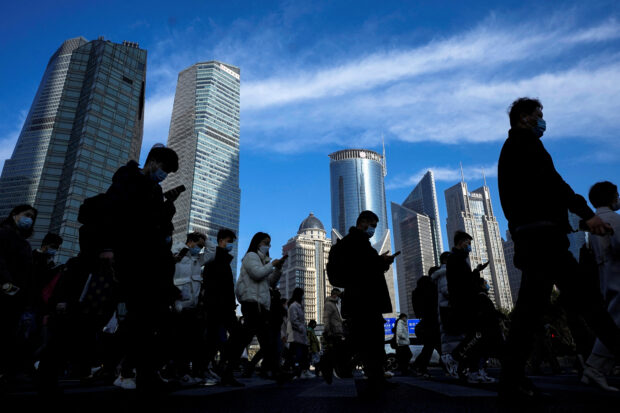
People cross a street near office towers in the Lujiazui financial district in Shanghai, China, Feb 28, 2023. REUTERS/Aly Song/File Photo
TOKYO – The International Monetary Fund (IMF) on Tuesday projected emerging Asian economies would expand 5.2 percent this year, slowing from 2023 but revised up from its forecast three months ago on stronger-than-expected growth in China.
The region’s growth forecast for 2024, which compared with a 5.4-percent expansion last year, was upgraded 0.4 percentage point from October. In 2025, emerging and developing Asia is expected to grow 4.8 percent, the IMF said in its upgraded World Economic Outlook.
China‘s growth estimate for this year was revised up by 0.4 percentage point to 4.6 percent on increased government spending, though it was still slower than last year’s 5.2 percent expansion.
READ: Developing Asia to end 2023 on brighter note, says ADB
The IMF said China‘s economy could recover faster than expected if Beijing makes additional property-sector reforms, such as restructuring insolvent property developers, or spends more than anticipated to boost consumer confidence.
‘Unintended fiscal tightening’
But it also warned of the risk that China‘s growth could underwhelm expectations if authorities resort to “unintended fiscal tightening” that could hurt consumption.
READ: China’s economy projected to slow sharply in 2024, World Bank says
“Absent a comprehensive restructuring policy package for the troubled property sector, real estate investment could drop more than expected, and for longer, with negative implications for domestic growth and trading partners,” the IMF said.
Growth in India is projected to remain strong at 6.5 percent in both 2024 and 2025, with an upgrade from October by 0.2 percentage point for both years, on resilient domestic demand, it said.
Among advanced economies, Japan’s growth is expected to slow to 0.9 percent in 2024 from last year’s 1.9 percent, as the effect of pent-up demand after the removal of pandemic-related curbs fades, the IMF said.